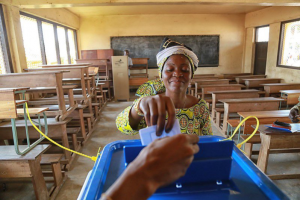By: Ann Ciancia
Journal of Global Rights and Organizations, Notes and Comments Editor
BANGUI, Central African Republic – The nation’s legislative and presidential elections took place on December 27th, 2020, where violence erupted in the proceeding days of the election. The Coalition of Patriots for Change (CPC) has forced over 55,000 civilians to flee their homes. Many people believe that the national government and the United Nations should get involved to protect the people of the Central African Republic from the escalating violence.

Over the last five years, the CPC has committed war crimes against the people of the Central African Republic. The CPC has caused violence throughout the nation by deliberately killing civilians, raping women and girls, and destroying property. The CPC is made up of six rebel groups, one group is awaiting trial at the International Criminal Court. The former president, François Bozizé, is believed to be behind this new violent coalition. Bozizé was president from 2003 until 2013, when he was forced out of office. He was not allowed to run in this year’s presidential election due to ineligibility on ‘moral grounds’ from UN sanctions and attempted to urge civilians not to vote.
Antonio Guterres, the Secretary-General of the UN, urged all individuals of the Central African Republic “to refrain from any action, including violence, hate speech, and incitement to violence, that could threaten human lives and undermine the electoral process and national stability.” He urged politicians to resolve differences peacefully and respectfully.
Two days before the election, peacekeepers from the UN mission and national security forces were attacked and three peacekeepers were killed by gunmen in the central and southern Central African Republic. There has been a major increase in violence against humanitarian individuals, civilians, state authorities, and candidates.
There was concern that a majority of the 1.8 million registered voters in the Central African Republic would not be able to vote due to the violence by armed members of the CPC. More than fourteen percent of polling stations, or 800 out of 5,408 stations, were closed during the elections due to violent attacks. Many citizens believed the election should have been postponed, but the government and the UN mission had rejected a postponement.
Security forces, assisted by UN peacekeepers, and reinforcements from Rwanda and Russia were able to fend off attacks, but rebels of the coalition opened fire in areas where elections were taking place. Despite the severe violence, many civilians turned out for the elections. The rebel groups of the CPC were hostile towards President Faustin-Archange Touadera, who is seeking a second term.
Even though several thousands of people did not receive their voter cards, the election results were announced on January 4, 2021. President Touadera won his reelection by achieving a majority vote with than 53 percent. Out of the many citizens registered to vote, over 75 percent of people came out to vote during this election.
Although rebel groups have seized several small villages close to the capital, the people of the Central African Republic were vigilant in using their power to vote in the presidential and legislative elections. It will be beneficial if the government and the UN take more action to ensure safety from the violent rebels throughout the Central African Republic.
For further information, please see:
Aljazeera – CAR violence forced closure of 800 polling stations: Commission – 28 Dec. 2020
BBC – Central African Republic election held amid violence – 28 Dec. 2020
CNN – Central African Republic President Touadera wins re-election – 5 Jan. 2020
Human Rights Watch – Central African Republic: Rebel Violence Threatens Elections – 23 Dec. 2020
Reuters – Central African Republic votes ‘massively’ amid sporadic rebel gunfire – 26 Dec. 2020
UN News – UN chief urges peaceful, credible elections in Central African Republic – 26 Dec. 2020